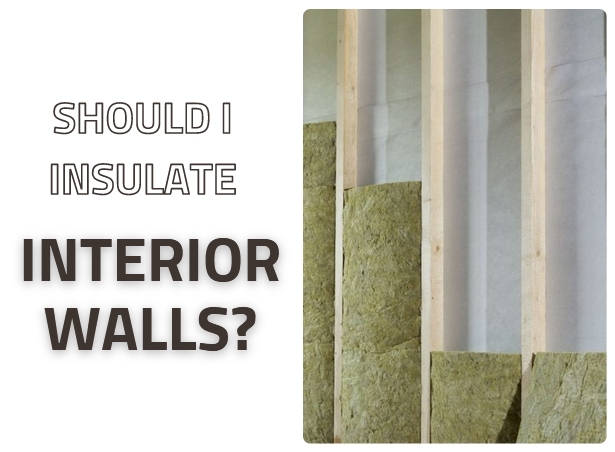Since there is no official or legal requirement to insulate interior walls, most homeowners wonder whether they should. Building codes require minimum insulation, especially for the ceiling and exterior walls.
Insulating interior walls is not required, so not all homeowners do so.
Some may do it for comfort, but some may skip it to save money. So, what is it interior wall insulation, and should you do it?
What Type of Insulation for Interior Walls
You should also start thinking about the best insulation type. With so many different types, picking one can be challenging. But each comes with its strengths and drawbacks, so understand each.

- Fiberglass Batts
This is one of the most common (and popular) types of internal insulation. It’s made from glass fibres woven into a mat and treated with a special fire retardant. It has a high R-value and is also easy to install, making it effective for trapping heat.
REad also: Insulation for Bathroom Walls Interior
Although this one is quite affordable, it doesn’t have enough airtight seal. It means that air can still circulate through your walls.
- Blown-in Cellulose
It’s usually made from recycled paper. You must use special equipment to ‘blast’ it into the wall. It functions as a fire retardant. Not only does it have a high R-value, but it is also great as an air seal. Because of its easy application, it’s perfect for DIY projects.
Despite these benefits, it may settle with time, meaning its function and efficiency may reduce over time.
- Spray Foam Insulation
Made from a chemical combo, this insulation will expand and solidify into a foamy texture. It has a high R-value that provides airtight cells. But because of its rather sophisticated nature, it’s quite costly. You will have to make significant expenses with this one.
- Rigid Foam Board Insulation
This one uses polyurethane or polystyrene, a hard substance directly placed on the walls. It functions as a (reliable) barrier against heat and its transmission and can also be used as external insulation.
This insulation has a high R-value, but it’s also expensive and must be done properly to ensure its effectiveness. Doing it wrong would be useless—you would only waste money and time.
Does Insulating Interior Walls Help with Sound?
Insulation helps with almost everything. First, it can improve the energy efficiency of the house by making the indoor temperature more comfortable. And it can happen all year round.
Insulation also helps with noise transfer. It can create a more ‘soundproof’ setting, although it may not be as effective as the real soundproof installation.
Moreover, you can deal with moisture control and improve it. Such insulation can reduce the possibility of leaks. You can reduce your carbon footprint, making your house somewhat more eco-friendly.
Is It Worth Insulating Internal Walls?
In retrospect, insulating the internal walls is worth it, especially for the long term. Wall insulation can make your house cooler during the summer months and warmer in winter.
Of course, it’s advisable to consult a professional expert to determine what you can do to your internal wall and which type is best for the application.
Final Words
It’s up to you whether you want to insulate your internal wall. Not only you make your house more comfortable, but you can also make it friendlier for Mother Earth. So, only you can answer the question: should I insulate interior walls?


